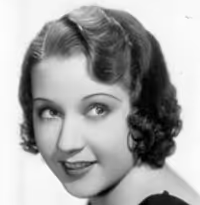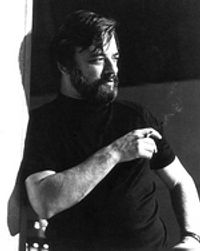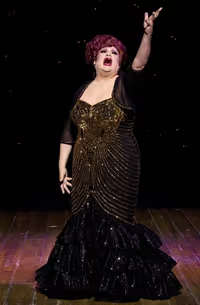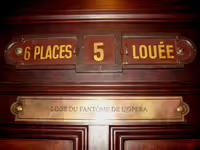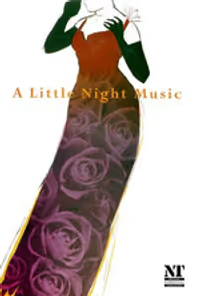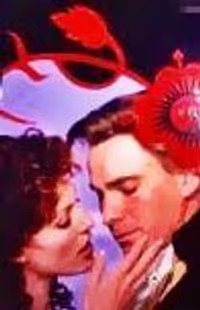How did Phantom lose Best Score??
#25How did Phantom lose Best Score??
Posted: 7/30/19 at 1:49am
Some of you have never heard of intentional musical motifs and themes and it really shows!
But seriously, there's a stark difference between the repetition of musical and lyrical phrases in Into the Woods (all intentional and done with the intent of furthering story and/or character) and ALW's inability to write more than 3-5 songs per show. You can dislike Sondheim, but dismissing his work as boring or painting him as not having any skill as a writer is absurd.
#26How did Phantom lose Best Score??
Posted: 7/30/19 at 1:57am
Speed said: "fashionguru_23 said: "You can't give best score to a show that only has 6 tunes that it recycles to over and over and over again."
ITW has less than 6 songs. Rapunzel's "AH AH AH HA etc" is a pervasive tune throughout. The phrase"Don't You Know What's Out There in the Woods" is the same musical phrase as the title phrase of "Giants in the Sky.""
It has at least ten, not even getting through Act 1 and not including lietmotifs. This is silly. Sondheim's music is beatiful and his lyrics ingenious. He's difficult.
Lloyd Webber is richly melodic in an easier-to-grasp-on-first-hearing way, and the lyrics he's had from Tim Rice as witty and sardonic.
#27How did Phantom lose Best Score??
Posted: 7/30/19 at 2:49am
A lot of debates on how the qualities of the scores compare but not a lot on why Phantom lost. I think it was because Sondheim hadn't won a Tony since Sweeney Todd and his win for Into The Woods was in some ways a makeup award for Sunday In The Park With George being ignored in all of the major categories it had been nominated in as well as a nod to the fact that Into The Woods was his biggest hit of the decade. Lloyd Webber was THE composer of the eighties who had won twice in the category for Evita and Cats(and also had been nominated for Joseph & The Amazing Technicolor Dreamcoat, Song & Dance, and Starlight Express) that decade and Phantom was a huge phenomenon that was obviously going to get its due in other categories. All of that plus a lot of voters probably felt Into The Woods was the more sophisticated out of the two so that caused them to pass over ALW.
Updated On: 3/27/24 at 02:49 AM#28How did Phantom lose Best Score??
Posted: 7/30/19 at 8:55amPhantom has pretty sounding music. Into the Woods’ score however was a thousand times more intelligent. While it may not be as hummable as Lloyd Webber’s score, Sondheim’s is clearly superior.
#29How did Phantom lose Best Score??
Posted: 7/30/19 at 9:07am
As people have pointed out, there's the fact that Phantom likes repeating the same melodies over and over again without any meaning behind it (so they're not really leitmotifs), that's certainly something that could've taken some votes from them.
There's also the fact that the lyrics of Into the Woods are smarter than those of Phantom: the Sondheim musical has more word play, better rhymes, and the metaphors certainly are better developed.
This is all a matter of opinion, of course, and speculation. Those are two reasons why I prefer Into the Woods score and would have voted for it if I had been a Tony voter back then, and I'm sure more people feel the same way.
#30How did Phantom lose Best Score??
Posted: 7/30/19 at 9:14am
perfectlymarvelous said: "the repetition of musical and lyrical phrases in Into the Woods (all intentional and done with the intent of furthering story and/or character)"
Did you have a private audience with Mr. Sondheim, during which he shared this developmental information with you, or should you have prefaced this statement with those all-important-but-usually-omitted three words, "In my opinion..."?
"Michael Riedel...The Perez Hilton of the New York Theatre scene"
- Craig Hepworth, What's On Stage
#31How did Phantom lose Best Score??
Posted: 7/30/19 at 9:26am
Lot666 said: "Did you have a private audience with Mr. Sondheim, during which he shared this developmental information with you, or should you have prefaced this statement with those all-important-but-usually-omitted three words, "In my opinion..."?"
You can read about Sondheim's use of various musical themes in the relevant chapter in Sondheim on Music. I don't have it in front of me now, but I believe he wrote out an explicit list of key themes before composing the bulk of the show, with labels attached referring to characters and plot elements. [ETA: It's on p. 82 of the recently released paperback edition of the book.]
By the way, though I easily prefer the score of Into the Woods, it's not even remotely true that Phantom has an unusually low number of distinct songs.
#32How did Phantom lose Best Score??
Posted: 7/30/19 at 9:33am
Least we forget that the themes in The Music of the Night sound so similar to Puccini's La Fanciulla that Puccini's estate sued ALW, and settled out of court.
Also that and Into the Woods is just a better score, and got more votes.
#33How did Phantom lose Best Score??
Posted: 7/30/19 at 9:38am
kdogg36 said: "You can read about Sondheim's use of various musical themes in the relevant chapter in Sondheim on Music."
Fair enough, but what do you think ALW would say about his use of musical themes in Phantom, if asked?
"Michael Riedel...The Perez Hilton of the New York Theatre scene"
- Craig Hepworth, What's On Stage
aj88
Featured Actor Joined: 3/18/15
#34How did Phantom lose Best Score??
Posted: 7/30/19 at 9:46am
Because Phantom’s score was, as many have said, repetitive...and frankly, even though I consider INTO THE WOODS to be one of Sondheim’s more overrated properties, the score is vastly superior to Phantom.
And Sondheim should’ve won for SUNDAY too.
#35How did Phantom lose Best Score??
Posted: 7/30/19 at 10:18am
Lot666 said: "kair enough, but what do you think ALW would say about his use of musical themes in Phantom, if asked?"
Although I don't love Phantom, I'm actually quite pro-ALW, and I have no doubt that a great deal of thought goes into creating his best scores. Years ago, in fact, I had a website that analyzed the score of Aspects of Love in rather excruciating detail!
#36How did Phantom lose Best Score??
Posted: 7/30/19 at 10:26am
Lot666 said: "kdogg36 said: "You can read about Sondheim's use of various musical themes in the relevant chapter in Sondheim on Music."
Fair enough, but what do you think ALW would say about his use of musical themes in Phantom, if asked?"
We don't have to ask the songwriter. It is the artist's job to convey their intentions through his art in a way that their intentions can be perceived by his art. We don't have to ask either Sondheim or Lloyd-Webber what they meant when they decided to repeat their melodies, it's up to every single person to interpret it. If you like it or see the meaning behind it, great. If you don't, that's fine too - though the music loses its power. I can think of many leitmotifs in Into the Woods and the meaning behind them, but only one in Phantom - the finale, after Christine has left and the Phantom sings to the tune of Music of the Night, which I think works very well. There's one I actually hate: in the second act, when Raoul is trying to convince Christine to go with his plan, and they play the same notes of Prima Donna. Makes no sense in my opinion.
TooTiredForThis
Chorus Member Joined: 6/9/19
#37How did Phantom lose Best Score??
Posted: 7/30/19 at 10:26am
Phantom's score is fun but contains some weak lyrics and is so inaccessible ttyl actors that is hard to create s character from them, it's overwrought in a way that makes the character elements bland. It's a phenomenal orchestral score but it's not one I listen to to be moved.
That said, as much as I actually do like both shows for their faults, the best song from the 87-88 season was definitely "Freedom is Coming Tomorrow", it still cracks up my heartbeat, and you can't help but punch the sky with it. Can we please get a Sarafina revival it would be timely as hell.
Honestly can we just talk about how strong that season was in general?
#38How did Phantom lose Best Score??
Posted: 7/30/19 at 10:34am
helvizz said: "There's one I actually hate: in the second act, when Raoul is trying to convince Christine to go with his plan, and they play the same notes of Prima Donna. Makes no sense in my opinion."
Well, this may be a bit superficial, but in both cases the object is to persuade someone to do something they're reluctant to do: the managers want to overcome Carlotta's indignation and get her to appear on stage again, and Raoul, as you said, wants Christine to fight through her fears and defeat the Phantom.
#39How did Phantom lose Best Score??
Posted: 7/30/19 at 10:38am
Speed said: "The phrase"Don't You Know What's Out There in the Woods" is the same musical phrase as the title phrase of "Giants in the Sky." "
The Witch sings that phrase to Rapunzel, who then is later killed by one of the aforementioned giants in the sky. A wonderful example of a leitmotif that subtly foreshadows the character’s upcoming tragedy.
After Eight
Broadway Legend Joined: 6/5/09
#40How did Phantom lose Best Score??
Posted: 7/30/19 at 11:10am
aj88 wrote:
“and frankly, even though I consider INTO THE WOODS to be one of Sondheim’s more overrated properties, the score is vastly superior to Phantom. “
Hardly. Phantom is like a ripe peach: luscious, the other one is like a desiccated sour apple: thoroughly indigestible.
“And Sondheim should’ve won for SUNDAY too.”
For that tuneless bore? To quote a popular song lyric from some time ago: “Never in a hundred, never in a thousand, never in a million years. Never in a million years.”
#41How did Phantom lose Best Score??
Posted: 7/30/19 at 11:20am
Came to this thread just to see AfterEight's response. Wasn't disappointed.
After Eight
Broadway Legend Joined: 6/5/09
#42How did Phantom lose Best Score??
Posted: 7/30/19 at 11:22am
Soaring29 wrote:
“I think it was because Sondheim hadn't won a Tony since Sweeney Todd and his win for Into The Woods was in some ways a makeup award for Sunday In The Park With George being ignored in all of the major categories it had been nominated in as well as a nod to the fact that Into The Woods was his biggest hit of the decade.”
And to think that we're told all the time that these awards are decided wholly on “merit.”
Funny, isn't it?
#43How did Phantom lose Best Score??
Posted: 7/30/19 at 11:24am
Best ORIGINAL score is the award.
POTO doesn't have an ORIGINAL tune in the entire musical.
"Music of the night" is a blend of "Come to Me, Bend to Me" from Brigadoon bridged with "Quello che tacete" from Fanciulla del West.
"Phantom of the Opera" is taken from Pink Flloyd's Echoes.
I could go on.
#44How did Phantom lose Best Score??
Posted: 7/30/19 at 11:43am
So Phantom didn't win Best Score but won Best Musical and it's not decided on merit?
Funny, isn't it?
#45How did Phantom lose Best Score??
Posted: 7/30/19 at 12:04pm
helvizz said: "We don't have to ask either Sondheim or Lloyd-Webber what they meant when they decided to repeat their melodies, it's up to every single person to interpret it"
My point exactly. I think this is all very subjective, yet there are lots of folks in this thread making sweeping, absolute declarations about what Sondheim did or didn't do, as if their declarations are irrefutable.
"Michael Riedel...The Perez Hilton of the New York Theatre scene"
- Craig Hepworth, What's On Stage
#46How did Phantom lose Best Score??
Posted: 7/30/19 at 12:07pm
Okay, yes, let's actually bring this up. WHY did Phantom loose. I think someone else or maybe even multiple people have said it. It's not in the music part of the score but in the lyrics part. Sondheim weaves his songs in Into the Woods with clever rhymes, smart wit, comedic gold, heart touching beauty. There is a wide and skillful range to the lyrics of Into the Woods almost as diverse as the personalities of the characters in his play.
MANY behind the scene and documentaries on Phantom of the Opera have touched on the disaster that was the writing of the lyrics in the show. To the point that you have two lyricists because one could not write a decent ballad and the other could not write decent conversational pieces. So there is an inconsistency between the flow of the lyrics. Between lovely ballads and wordy conversation pieces. And that's.... kinda the range you have. It's either a lovely ballad or a wordy conversation piece. There is no other range to the songs then that.
#47How did Phantom lose Best Score??
Posted: 7/30/19 at 12:09pm
"Lunacy! It's your fault!"
Shh_413
Stand-by Joined: 4/24/18
#48How did Phantom lose Best Score??
Posted: 7/30/19 at 1:05pm
Here are a couple of clips I found on Youtube from MTI where Sondheim himself discusses how to interpret and play the songs. He gives insight on major themes that permeate the score, further the plot, and develop character. https://www.youtube.com/watch?v=psk5KyE7MOg - The 6-note bean theme that's present in Jack's song to Milky White, the beginning of "Stay With Me", and "Giants in the Sky" https://www.youtube.com/watch?v=9AfHZlofGU4 - "Hello, Little Girl" as a two-piece contrasting song with vaudeville themes that allows delineation of Red's easygoing nature and the Wolf's mysterious, predatory character https://www.youtube.com/watch?v=iGQlbaITD5E - How the intentions of the opening prologue begin from the first note in "Once upon a time...", the "marching" staccato beat signifying characters walking towards the woods, etc. The whole 52 minute video is here: https://www.youtube.com/watch?v=NUN_MTChn5M This is for those who insist that Sondheim intentionally leaves the score for Into the Woods vague and dismisses his overt intentions as "subjective declarations" of fanboys. He knew what he was doing and everything had a clear purpose. I personally don't care about anyone's opinions regarding Phantom's score, and don't have any strong ones myself, but just thought these links might help clear things up.
#49How did Phantom lose Best Score??
Posted: 7/30/19 at 1:10pm
Soaring29 said: "A lot of debates on how the qualities of the scores compare but not a lot on why Phantom lost. I think it was because Sondheim hadn't won a Tony since Sweeney Toddand his win for Into The Woods was in some ways a makeup award for Sunday In The Park With George being ignored in all of the major categories it had been nominated in as well as a nod to the fact that Into The Woods was his biggest hit of the decade. Lloyd Webber was THE composer of the eighties who had won twice in the category for Evita and Cats(and also had been nominated for Joseph & The Amazing Technicolor Dreamcoat, Song & Dance, and Starlight Express) that decade and Phantom was a huge phenomenon that was obviously going to get its due in other categories. All of that plus that probably a lot of voters feltInto The Woods was the more sophisticated out of the two caused them to pass over ALW sothey gave Sondheim the award."
Very much agree with this assessment. Plus, it was an unfair time for Lloyd Webber. Somehow, an aesthetic issue became a moral controversy, and Lloyd Webber was somehow "evil" while Sondheim was "angelic." They were both just composers making exactly the kinds of shows they wanted to make. There was a lot of silliness about Lloyd Webber vs. Sondheim, as earlier there had been about Jerry Herman vs. Sondheim.
Videos



